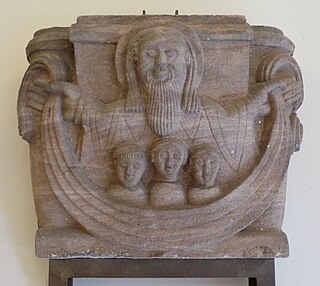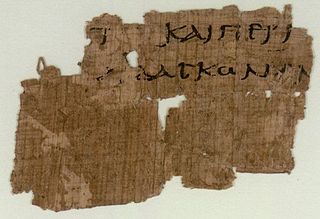
The Gospel according to Matthew, also called the Gospel of Matthew, or simply Matthew, is the first book of the New Testament and one of the three synoptic Gospels. It tells how Israel's Messiah, Jesus, rejected and crucified by Israel, condemns Israel, and sends the disciples to preach the gospel to the Gentiles instead. Matthew seems to emphasize that the Jewish tradition should not be lost in a church that was increasingly becoming gentile. The gospel reflects the struggles and conflicts between the evangelist's community and the other Jews, particularly with its sharp criticism of the scribes and Pharisees with the position that through their rejection of Christ, the Kingdom of God has been taken away from them and given instead to the church.
In Christianity, the "exterior darkness" or outer darkness is a place referred to three times in the Gospel of Matthew into which a person may be "cast out", and where there is "weeping and gnashing of teeth". Generally, the outer darkness is thought to be hell; however, many Christians associate the outer darkness more generally as a place of separation from God or from the metaphorical "wedding banquet" that Jesus is expected to have upon his Second Coming.

The Promised Land is the land which, according to the Tanakh, God promised and subsequently gave to Abraham and to his descendants. In modern contexts the phrase "Promised Land" expresses an image and idea related both to the restored Homeland for the Jewish people and to salvation and liberation.

Jacob's Ladder is a ladder leading to heaven that was featured in a dream the biblical Patriarch Jacob had during his flight from his brother Esau in the Book of Genesis.
Zabūr is, according to Islam, the holy book of Dawud (David), one of the holy books revealed by Allah before the Quran, alongside others such as the Tawrat (Torah) of Musa (Moses) and the Injil (Gospel).

Matthew 1 is the first chapter of the Gospel of Matthew in the New Testament. It contains two distinct sections. The first lists the genealogy of Jesus from Abraham to his legal father Joseph, husband of Mary, his mother. The second part, beginning at verse 18, provides an account of the virgin birth of Jesus Christ.

"Bosom of Abraham" refers to the place of comfort in the Biblical Sheol where the righteous dead await Judgment Day.

Matthew 3:2 is the second verse of the third chapter of the Gospel of Matthew in the New Testament. John the Baptist has just been introduced and this verse describes the message that he is preaching. Through John's message, Matthew introduces the "Kingdom of Heaven".

Matthew 3 is the third chapter of the Gospel of Matthew in the New Testament. It is the first chapter dealing with the ministry of Jesus with events taking place some three decades after the close of the infancy narrative related in the previous two chapters. The focus of this chapter is on the preaching of John the Baptist and the Baptism of Jesus.

Matthew 3:9 is the ninth verse of the third chapter of the Gospel of Matthew in the New Testament. The verse describes an incident where John the Baptist berates the Pharisees and Sadducees. He has previously called them a brood of vipers and warned them of the wrath to come and has urged them to repent. In this verse he warns that their links to Abraham will not save them.

Matthew 4 is the fourth chapter of the Gospel of Matthew in the New Testament of Christian Bible. Many translations of the gospel and biblical commentaries separate the first section of chapter 4 from the remaining sections, which deal with Jesus' first public preaching and the gathering of his first disciples.

Matthew 5 is the fifth chapter of the Gospel of Matthew in the New Testament. It contains the first portion of the Sermon on the Mount, which will also take up chapters 6 and 7. Portions are similar to the Sermon on the Plain in Luke 6, but much of the material is found only in Matthew. It is one of the most discussed and analyzed chapters of the New Testament. Warren Kissinger reports that among Early Christians no chapter was more often cited by early scholars. The same is true in modern scholarship.

Matthew 5:48 is the forty-eighth and final verse of the fifth chapter of the Gospel of Matthew in the New Testament and is part of the Sermon on the Mount. This is the final verse of the final antithesis, and it is a summary of Jesus' earlier teachings.

Matthew 6:33 is the thirty-third verse of the sixth chapter of the Gospel of Matthew in the New Testament and is part of the Sermon on the Mount. This verse continues the discussion of worry about material provisions.

Matthew 8:7 is the seventh verse of the eighth chapter of the Gospel of Matthew in the New Testament. This verse continues the miracle story of healing the centurion's servant, the second of a series of miracles in Matthew.

Matthew 8:10 is the tenth verse of the eighth chapter of the Gospel of Matthew in the New Testament. This verse continues the miracle story of healing the centurion's servant, the second of a series of miracles in Matthew.
Matthew 8:9 is the ninth verse of the eighth chapter of the Gospel of Matthew in the New Testament. This verse continues the miracle story of healing the centurion's servant, the second of a series of miracles in Matthew.
Matthew 8:12 is the twelfth verse of the eighth chapter of the Gospel of Matthew in the New Testament. This verse is part of the conclusion to the miracle story of healing the centurion's servant, the second of a series of miracles in Matthew. This verse warns that many Jews are lacking in faith after praising the Gentile Centurion in the previous verse for his.

Matthew 27:11 is the eleventh verse of the twenty-seventh chapter of the Gospel of Matthew in the New Testament. This verse brings the narrative back to Pilate's Court, and the final trial of Jesus.

Healing the centurion's servant is one of the miracles said to have been performed by Jesus of Nazareth as related in the Gospel of Matthew and the Gospel of Luke. The story is not recounted in the Gospels of either John or Mark.














